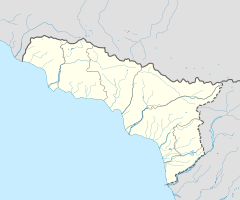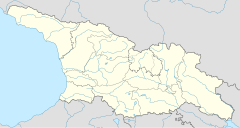Msygkhua church
| Msygkhua Church მსიგხვის ეკლესია (in Georgian) Мсыгәхәа ауахәама (in Abkhaz) | |
|---|---|
| Religion | |
| Affiliation | Georgian Orthodox |
| Province | Abkhazia[1] |
| Ecclesiastical or organizational status | ruins |
| Location | |
| Location | |
| Geographic coordinates | 43°05′18″N 40°42′03″E / 43.08833°N 40.70083°E |
| Architecture | |
| Type | Church |
| Completed | 8-9th century |
The Msygkhua church (Abkhaz: Мсыгәхәа ауахәама; Georgian: მსიგხვის ეკლესია) is a ruined medieval church at the village of Tskuara (Phsygkhva) in Abkhazia, an entity in the South Caucasus with a disputed political status. It is located on the eponymous hill in the Tskuara river valley, immediately west of the town of New Athos, at the Black Sea coastline.[2]
History
[edit]In 1962, the remains of an old cult building were found on Msigkhva Mountain. The ruins were excavated and dated to the 10th century by Anatoly Katsia in the 1960s. It is a small edifice, with the dimensions of 9.8 x 7.6 m. The walls survive to the height of 1.6 m. The church is set in a Middle Byzantine cross-in-square design, with the dome resting on four cruciform columns and three protruding apses, of which the central one was pentahedral on the exterior and horseshoe-shaped on the interior, while the side apses were semi-circular in shape. Liturgical items such as three tables in the center of each apse and parts of the altar screen have survived. Among the fragments of the tiles part of an antefix with a "Maltese cross" and Georgian inscriptions was discovered,[3] which make it clear that the church was built in the name of Archangel Michael. It is one of the earliest specimens of Georgian script found in Abkhazia and western Georgia in general.[4]
References
[edit]- ^ The political status of Abkhazia is disputed. Having unilaterally declared independence from Georgia in 1992, Abkhazia is formally recognised as an independent state by 5 UN member states (two other states previously recognised it but then withdrew their recognition), while the remainder of the international community recognizes it as de jure Georgian territory. Georgia continues to claim the area as its own territory, designating it as Russian-occupied territory.
- ^ Mountain church in Phsygkhva village Historical monuments of Abkhazia — Government of the Autonomous Republic of Abkhazia.
- ^ Khrushkova, Liudmila G. (2018). Восточное Причерноморье в византийскую эпоху. История. Архитектура. Археология [The East Coast of the Black Sea in the Byzantine era. History. Architecture. Archaeology] (in Russian). Kalininigrad – Moscow: ROS-DOAFK. pp. 137–139. ISBN 978-5-6040479-8-9.
- ^ Kapanadze, Salome, ed. (2007). Georgian Cultural Heritage. Book 1: Abkhazeti. Tbilisi: Ministry of Education and Culture of Abkhazia. pp. 114–115.
External links
[edit]- Msigkhva Mountain church Historical monuments of Abkhazia — Government of the Autonomous Republic of Abkhazia.


